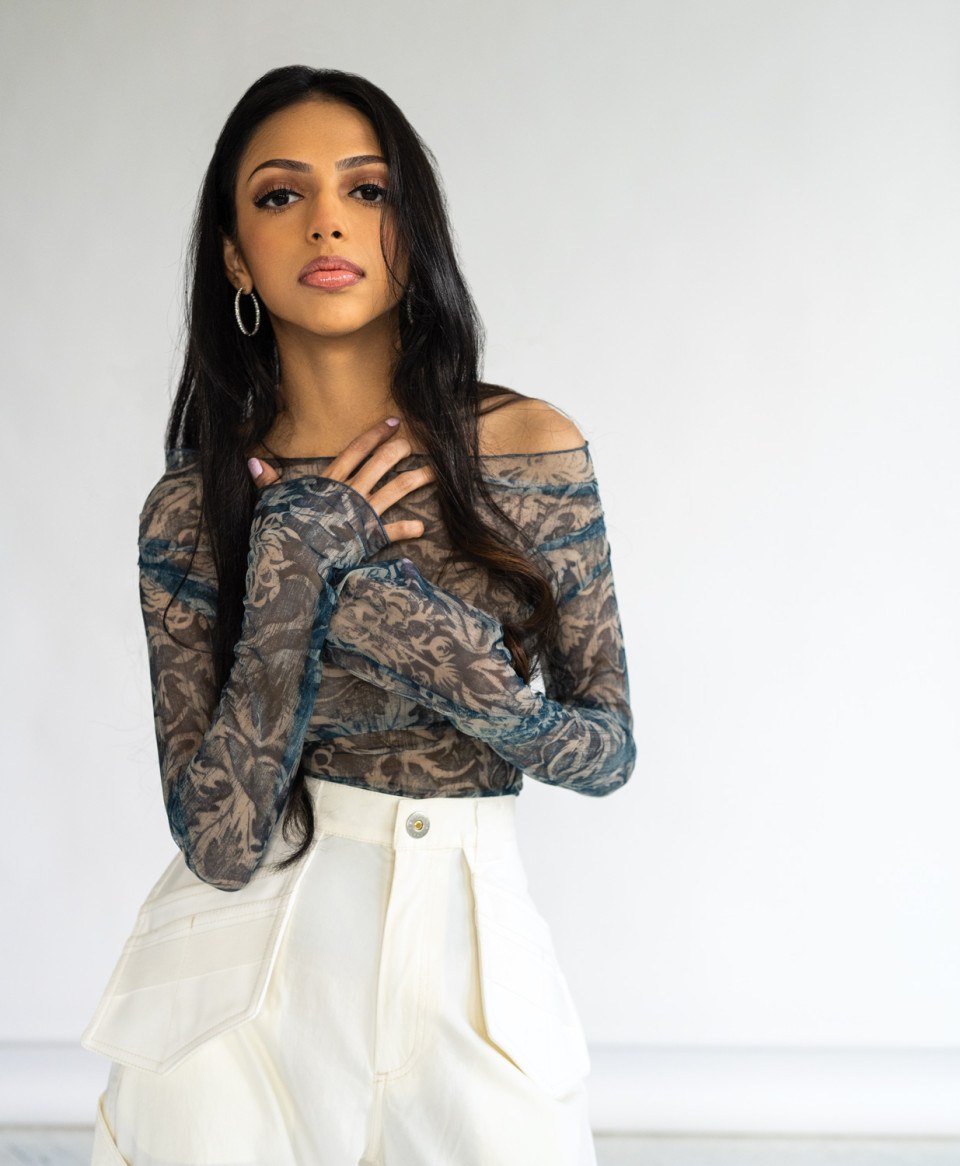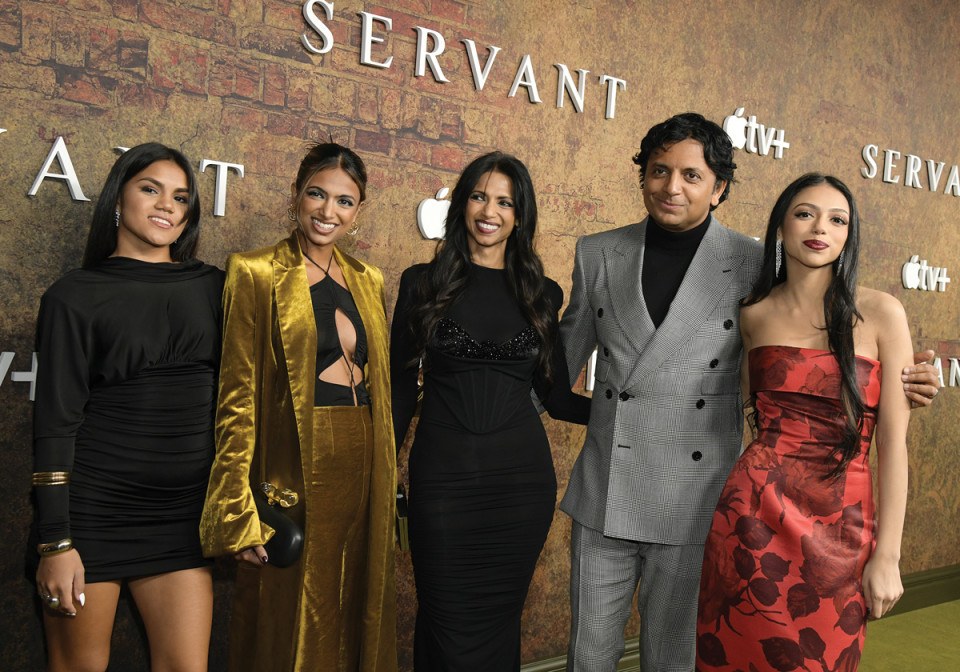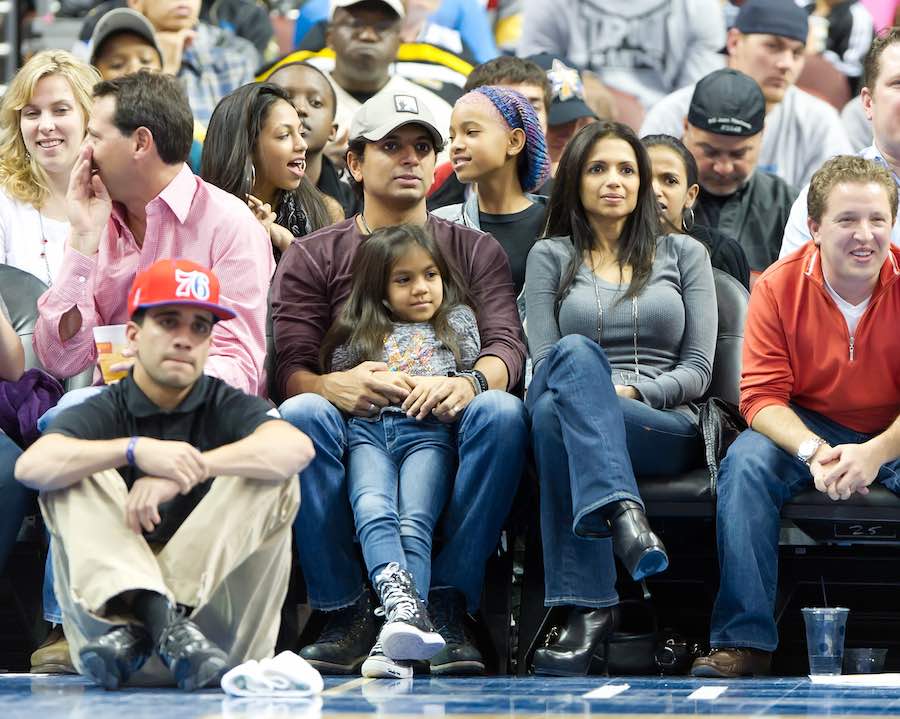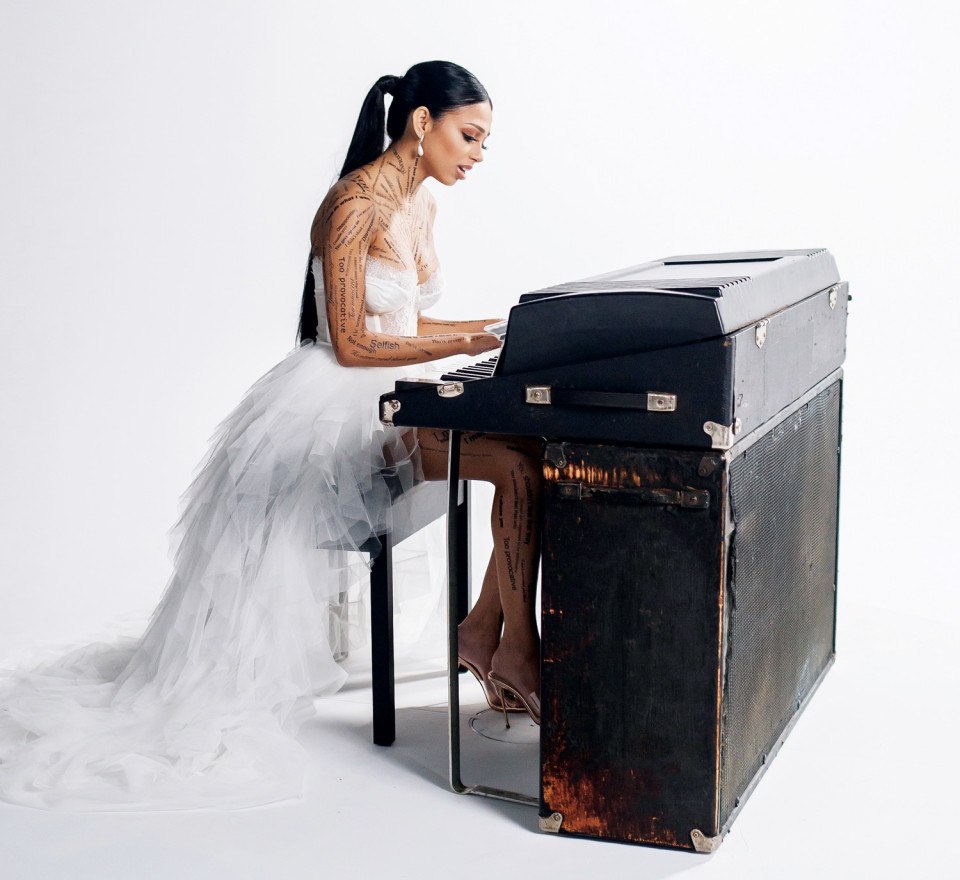Saleka Shyamalan Is Staking Her Own Claim in Showbiz
An interview with M. Night Shyamalan's 26-year-old daughter, who grew up in Bryn Mawr and lives in Rittenhouse Square.

Saleka Shyamalan, the eldest child of M. Night Shyamalan / Photograph by Linette & Kyle Kielinski
Born and raised in Bryn Mawr and now living in Rittenhouse Square, Saleka Shyamalan just released her first album, Seance, a debut that shows both her love for R&B and her intense classical training. She performs at World Cafe Live on June 22nd. Here, she talks songwriting, life on the Main Line and, yes, being the firstborn of M. Night Shyamalan.
Hi, Saleka. All this time, I thought your name was pronounced “Suh-LAY-kuh.” But I’m pretty sure your publicist just introduced you as “Suh-LEE-kuh.” Which is it?
All I know is that my family has always called me “Suh-LEE-kuh.” But there’s probably some traditional Indian pronunciation I don’t know about.
And your last name must be one of the more mispronounced in Hollywood.
Yes! [laughs] The “y” is silent! People mispronounce it all the time. It was my grandfather’s first name, and where he comes from in Kerala, India, the children take the father’s first name as their last. And once they came over to the U.S., everyone took that as their last name for good.
When did your family first come to the U.S.?
My grandparents came to Philadelphia in 1968, when they were in their late 20s, to be doctors. My dad was actually born in India but raised here. And my mom’s side came over later. She grew up in Hong Kong and came here when she was 17.
Why Philadelphia?
They really settled here relatively arbitrarily. You couldn’t google anything back then. All they knew is that they wanted to come to America. To my grandfather, America epitomized the ideas of freedom and living your dreams and aspirations. He knew he wanted to be on the East Coast. And he wound up loving Philadelphia for its sense of history.
I know you grew up in this area, but do you still live here?
Yes. I just moved into an apartment in Rittenhouse a couple of months ago, and I love it. I enjoy being here and seeing all the people around. It’s really beautiful. Before Rittenhouse, I was in Malvern, where my parents live. And I grew up in Bryn Mawr. So other than going to college at Brown, I’ve been here. Brown was a good place for me to go. The town is gentle and artistic and not overwhelming, but it was still a big change from me growing up with family at home all the time. I was very sheltered.
If I head out in Rittenhouse Square on the average Saturday night, will I find you barhopping with your girlfriends?
No! I don’t drink. [laughs] I’m a homebody. I stay in my house and make music and enjoy home life. But I do love food, so having the Love, Parc and Barclay Prime right next to me is a good thing.
Congrats on the new album, Seance. I’m told you’re already working on the next. You couldn’t take a break?
Writing music for me feels very exciting and a natural element of my life. I’m always writing. I worked on another musical project for my dad’s TV show, Servant, earlier this year. It’s been really interesting releasing two projects in one year and meanwhile working on a third. There are days where I wish I had a week to deep-clean my house and take lots of naps. [laughs]
Is it my imagination, or did “Clarity,” your first single from Seance, come out way back in 2020? COVID delays?
Definitely. That song was the first piece I ever released, and I actually started writing it years before. This album was a learning process in every way. Not just in how to write music and produce it, but also how to release it and make videos.
Your songwriting seems very personal, telling stories about your relationships, feelings and thoughts. Since you started writing these songs in 2020 and earlier, does listening to them now make you reflect on whoever you were at the time of their inception? You’re only 26, and you might be such a different person now than you were when you penned a given song.
I’m excited to release these songs, but it’s with mixed and confused emotions. When I listen to some of them, it doesn’t feel like me currently, or it’s not how I would write music right now or how I think about things now. So I am trying to grapple with that by thinking of it as, This is a version of me that existed. This is a very unique album for me, and that won’t ever happen again due to the large span of time involved in making this. It was a very significant period in my life. I feel like I became an adult throughout the process, and you only go through that once. This album took years. The next will be made in six months.
Some albums, such as yours, feel like they’re best enjoyed from beginning to end. Yet we all know that’s not the culture these days.
There is value to a single. But there’s more storytelling and nuance if you listen from beginning to end. When you listen to an entire album, you get a sense of the artist’s true vision — 45 minutes, as opposed to three. When I was growing up, I listened to albums from beginning to end over and over again. Some of those albums helped me through a certain time or relationship. A full-form album has the power to do that more than just songs on shuffle.

From left: Shivani and Ishana Shyamalan, Bhavna Vaswani, and M. Night Shyamalan and Saleka Shyamalan at the Season 4 premiere of Servant in January / Photograph by Kristina Bumphrey/Getty Images
I have to admit, when I first heard a few years back that M. Night Shyamalan’s daughter fancied herself a singer, the journalist in me cynically rolled my eyes.
[Laughs]
But then a friend brought me to see you at World Cafe Live, and it was clear this wasn’t something you just waltzed into. You obviously have a long background in music training.
Thank you! I totally understand that instinct, and it’s not just a journalist’s. That stigma prevented me from going into this field for a bit, because of what people might think. But I’ve been studying classical piano from the age of four. My whole life is me playing piano. A lot of Asian parents put their kids in classical music, and mine were no different. By the time I was six, I was a very serious piano student. My parents were quite strict about it all, and my teacher had the mentality of: Classical music is serious. You don’t do it lightly or for fun. I thought I would become a concert pianist and go to conservatory.
Which Brown most definitely is not.
Well, when I was 16, I wrote my first songs and realized I loved multiple facets of music. Classical is all about staying true to what you’re reading and portraying another composer’s vision as close to what was intended as possible. I was finding a passion in myself, a desire to write and create my own things. I also started to love poetry. All of this came together in my songwriting, and it really developed naturally from my classical studies.

Saleka Shyamalan (second row, left) chats up Willow Smith at a Sixers game in 2012 as her parents M. Night Shyamalan and Bhavna Vaswani watch the game (Getty Images)
Right. Though your music is most definitely in the R&B spectrum, the classical progressions and sounds are quite present.
Absolutely. I will find a riff in a classical song, and something will flow out of that.
You said your parents were strict. What did they think of this idea of Saleka the singer?
They thought it was a phase. They thought I was betraying my training and that I just loved the idea of being a songwriter. I think they were mainly skeptical because the music industry was something my family knew nothing about. So it was scary for their kid to pursue such an unknown and fickle path. But once I sat down and played for them the first few songs I ever wrote — just playing at the piano and singing in our living room, almost like a little recital — they were able to see my love for it and how it was a direct expansion of my music training. So it didn’t feel like me giving up on something anymore. They realized I was just taking the same discipline and technique and transferring it to this new form. And they became very supportive.
And your oh-so-serious piano teacher?
[Laughs] She had a very strict mentality about classical music being the ultimate form of music and that pop or R&B are lesser forms, on a more surface level. She didn’t understand. But that all makes sense from where she was coming from. In some pop and R&B, there is a sort of lack of discipline and integrity and respect for the music. But I hope to conduct myself and my music and my performance and my writing with the integrity that she taught me.
What music did your parents expose you to?
I had this weird combination of classical training, but then in the house, my dad would play a lot of R&B and hip-hop. My mom, a little jazz and blues. And there was also Bollywood and more traditional Indian sounds.
Your own sound seems to embody much of that.
Yes, you can fairly easily draw a line from the music that surrounded me as a child to my music today.
People expect you to have a certain personality or career. It’s been a lot for me to navigate, holding onto this Indian culture but also being an American. I didn’t grow up in India. So some Indians don’t relate to me, because I’m not Indian enough.”
You were just a toddler when your dad’s most acclaimed film, The Sixth Sense, came out. He became instantly famous. How did that affect your childhood?
My parents did a good job of creating a very normal life for me and my two sisters. We went to normal schools and had normal expectations, and we weren’t allowed to go out. We had a normal, sheltered, Asian, strict-parents childhood. I got straight A’s, came home and studied, had a small group of friends who would all hang out at my house. I lived in a bubble of safety and love. His “fame” never became much of a big thing.
What do people get wrong about you because of your heritage?
How do you mean?
Well, for instance, my wife was born in Chennai, and I can’t tell you how many friends have assumed she’s a vegan.
[Laughs]
Because she must be Hindu. Meanwhile, she’s a Presbyterian who will eat any formerly living thing you put in front of her.
[Laughs] Yes, there is definitely that assumption! More damaging, though, is people expect you to have a certain personality or career. It’s been a lot for me to navigate, holding onto this Indian culture but also being an American. I didn’t grow up in India. So some Indians don’t relate to me, because I’m not Indian enough.
I know that one of your sisters, Ishana, has been involved with your musical projects.
Yes, she graduated from film school and has directed my music videos. It’s amazing to be able to work together. We collaborated with my dad on Servant as well. I wrote songs for seven episodes, and she directed some of those episodes. And I’m working with my family a lot on my next project.
You went to Baldwin. I’ve heard good things. I’ve heard bad. What was that experience like?
An all-girls private school is a very specific thing. I think I needed to go there to be where I am now. I was a very quiet, nervous, nerdy child who lacked confidence. Baldwin changed that. It wasn’t exactly “fun.” Baldwin was academically grueling. But the skills I learned at Baldwin trained me for Brown, and I am still applying those skills today. Working hard. Grinding.

Saleka Shyamalan recording the 2021 video for her song “Graffiti” / Photograph by Morgan Smith
Most kids can’t go to Baldwin or Brown. Most don’t have a dad whose movies have grossed over $3 billion. How do you, coming from this level of privilege, help pave the way for those less fortunate?
At this stage of my life, I don’t have a clear answer for that. This will be a lifelong journey for me, to try to give back and help others. I’m still finding my way in this respect. I’m involved in activism and social justice, and a lot of that comes from my mom, who has been involved in these issues and philanthropy, at home and internationally, for most of her life. And I’m currently doing work with the Philly nonprofit Beyond the Bars, which gets at-risk youth into music programs and makes sure every child has access to musical education. So for now, I am focusing on supporting organizations like that as well as the Syrian Emergency Task Force, which my family’s foundation supports, and learning and spreading the word. There are a lot of people who listen to what my dad says. So there is power in that.
Okay, let’s get real. I know what my favorite and least favorite M. Night Shyamalan movies are. Yours?
[Laughs] Oh, don’t do that to me!
Hey, I have to ask at least one cringey question in every interview.
You have to understand that growing up, I was on the sets. The actors were my friends. It’s so hard to disassociate from that. When he was making a movie, we’d see all the edits. We’d talk about it at the kitchen table. When he was shooting, it was so integrated with my life. It’s interesting to watch his movies now, as an adult. It’s not like we sat at home watching the final products over and over again on movie night. We would go to the premiere, and that would be that. But not long ago, we went to a 20th anniversary event for The Sixth Sense. That was a profound experience. I related to it in such a different way. And I saw a preserved version of my dad, who was my age when he began making that.
To me, your father has always seemed to be rather humble.
He always said that if anybody came up to him or recognized the name and said something good or bad … if they saw one of his movies, that paid for one brick of our house or some of our groceries. It was always received and embraced with gratitude. And I hope that same humility and gratitude are evident in me.
This interview has been edited for length and clarity.
Published as “Finding Her Voice” from the July 2023 issue of Philadelphia magazine.


